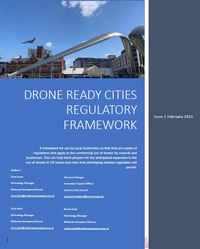Advanced Air Mobility
Drones and Advanced Air Mobility (AAM) are rapidly-emerging sectors of aerospace which are bringing highly-automated vehicles to the market such as remotely piloted, autonomous, or electric vertical take-off and landing (eVTOL) aircraft.
The market for intra-city, inter-city, personal and emergency/parapublic air transport created by this disruptive market could reach $510bn by 2040. Drones also have the potential to contribute £45bn to the UK economy*.
The MAA is supporting the supply chain with opening up opportunities in the drone and AAM industry, and helping to remove barriers to entry, which is important given the market’s high growth potential.
DRONE READY CITIES
The use of commercial drones in the urban environment has the potential to create enormous value to the UK economy, reduce carbon emissions, create jobs and save costs.
However, current regulatory restrictions prevent our economy benefitting from these opportunities. The MAA has developed a non-airspace regulatory framework for drones that will permit their wider use while ensuring public safety through the Drone Ready Cities project.

The aim
Drone technology is already at the point where many valuable urban applications are feasible and can deliver social and economic benefit. Regulatory change is set to permit routine qualifying drone operations beyond the pilot’s line of sight from 2027.
This will cause the social and economic benefit case for many uses to improve, meaning that the services being offered and taken up by end-users will increase. For local authorities, this will mean increasing numbers of drone operations and operators in their areas.
Although the regulation of UK airspace lies with the Civil Aviation Authority (CAA), the operation of drones within the local authority area has regulatory and policy implications that relate to local airspace, ground infrastructure, supporting services, security, privacy, protecting the environment, and maintaining social equity.
Currently, local authorities are uncertain and fearful of the regulation that might apply, preventing them from reducing costs, reducing CO2 emissions and potentially even saving lives through innovation in council service provision using drones.
The Drone Ready Cities project aims to help UK councils to overcome this regulatory barrier.

The partners
The UK Government awarded Coventry City Council a grant of £268,175 via the Regulators’ Pioneer Fund (RPF) to deliver Drone Ready Cities, which started in September 2023. The RPF is a grant-based fund to enable UK regulators and local authorities to help create a UK regulatory environment that encourages business innovation and investment. The current £12m round is being delivered by the Department of Science, Innovation & Technology.
Coventry City Council is partnered with the MAA to deliver the project, with our team providing specialised aviation and aerospace industry knowledge and technology expertise.
The approach
- Regulatory framework development: The Drone Ready Cities project is reaching its advanced stages and has now developed a Regulatory Framework which has been reviewed by industry innovators and other stakeholders.
The framework is free to download here.
- Drone trials: Drones are being trialled as part of the project to:
- Identify current pressure points within data capture that could be addressed by drones.
- Categorise current, near-term and long-term requests to perform drone operations.
- Scope out inter-department use of shared data.
- Stress-test the Regulatory Framework that the project has created.
- Impact assessment: Monthly reporting by the outsourced drone operator and provider of captured data includes assessment of the impact of drones, the regulatory challenges encountered and whether the regulatory framework is fit for purpose.
- Knowledge sharing: The team are disseminating the findings from the project and the regulatory framework through presentations at key conferences, forums and exhibitions as well as through a direct mail campaign to councils.
- Support for councils: Until project completion on 31st March 2025, UK councils are being offered support to start using drones including funded drone demonstrations to confirm the viability and benefits of their chosen use case.
The impact
- Preparing local economies, societies and councils to benefit from drones: The Drone Ready Cities project is preparing councils for the anticipated expansion in the use of drones in UK. Drones have the potential to benefit our society by:
- Increasing safety and efficiency, for example blue-light services, infrastructure and maintenance.
- Reducing CO2 emissions.
- Delivering social benefit, for example faster medical sample transport.
- Reducing ground transport congestion.
- Reducing costs of logistics deliveries.
- Creating new business and job opportunities.
- Improving efficiency and sustainability through innovation: Opening up opportunities by supporting councils with enabling regulations for drones, innovative organisations in the sector will be able to deliver goods and services faster, cheaper, more safely, and with lower environmental impact.
- Creating competitive advantage for Midlands aerospace: The MAA’s expertise in high-growth, non-traditional aerospace segments is furthered by supporting projects like Drone Ready Cities. This insight is shared with members and aerospace supply chain companies in the region – for example at events, workshops and airshows – offering them the chance to get ahead of the global market and gain a competitive advantage.
- Giving Midlands Advanced Air Mobility a strong voice: As the MAA’s profile and voice grows in the emerging future flight sector with innovators, funders, regulators and other stakeholders, the voice of the Midlands becomes stronger. This could lead to greater opportunities for members and aerospace supply chain companies in the region.







